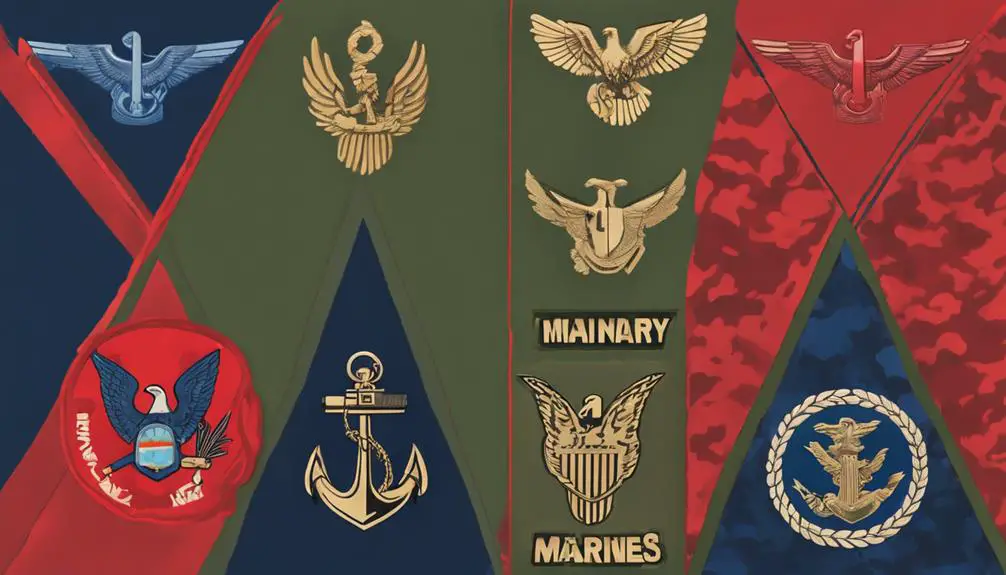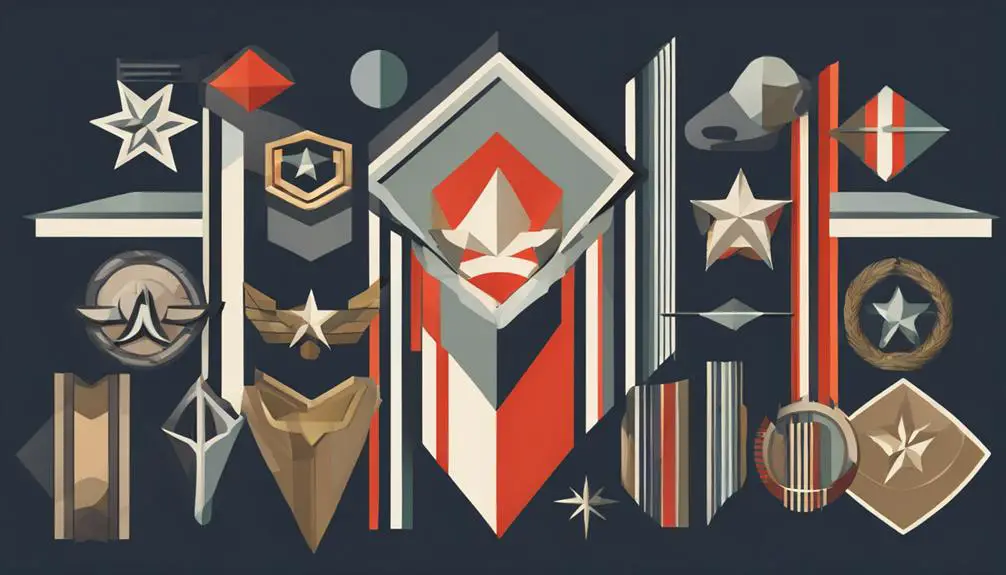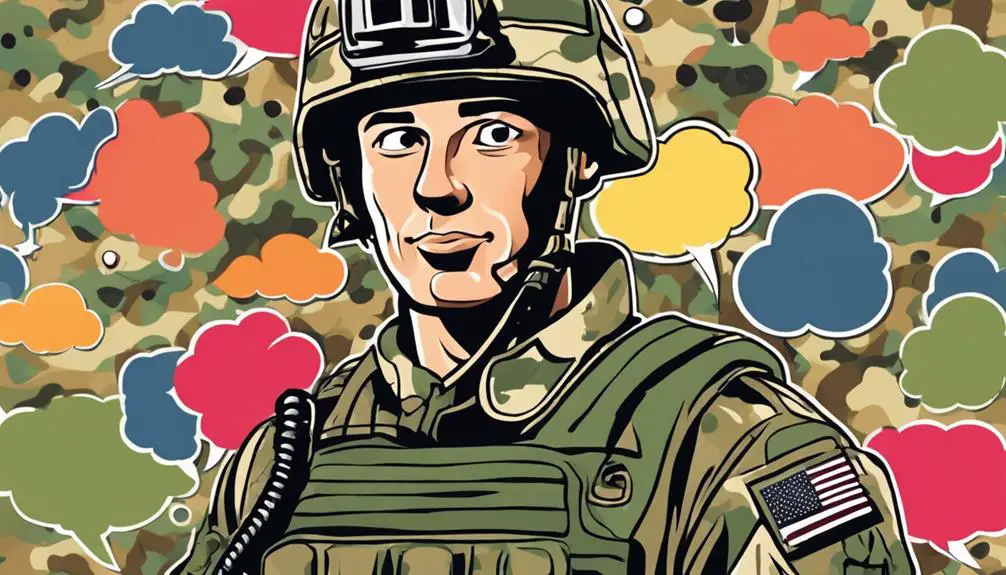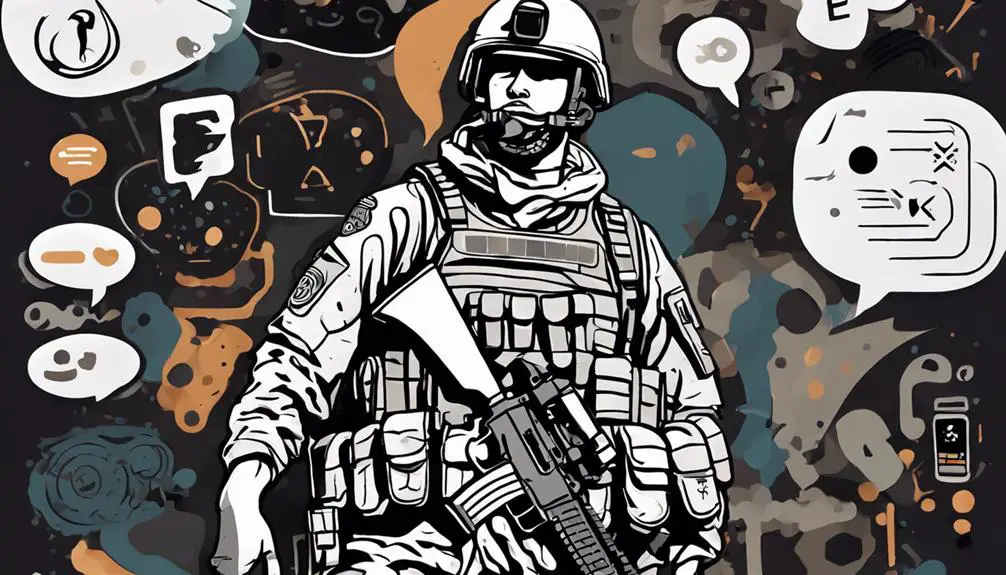You're familiar with military slang, but staying current can be tough, especially with over 15,000 distinct terms in use. Navy nicknames like "SWO" for Surface Warfare Officer are just the beginning. In combat, "Sitrep" summarizes the situation, while "Op Tempo" describes the pace of operations. Ranks have their own lingo, with "Brass" for high-ranking officers and "Grunt" for junior enlisted personnel. Equipment slang includes "Rig" for vehicle setup and "Commo" for communication gear. Humor and sarcasm are also essential, with "Sarcasm Shields" helping to detect and deflect jokes. As you explore military slang, you'll discover even more nuances that bring you closer to the culture.
Branch-Specific Slang Terms

In each military branch, you'll encounter unique slang terms that reflect their distinct culture and history. These branch-specific terms are a key part of the military's linguistic landscape.
In the Navy, you'll hear nicknames like 'SWO' for Surface Warfare Officer or 'Gundeck' for a fake or exaggerated report. These Navy nicknames have become an integral part of life on the high seas.
Meanwhile, in the Marine Corps, you'll encounter metaphors that reflect their rugged, no-nonsense attitude. Marines often use metaphors like 'Tip of the Spear' to describe the front line of battle or 'Frozen Chosin' to refer to a particularly harsh winter. These Marine metaphors are woven into the fabric of their proud tradition.
Slang for Combat and Ops
What's the first thing that comes to mind when you hear 'Situation Report' or 'Sitrep' – an essential piece of intel that keeps you ahead of the enemy? In combat and ops, situational awareness is key, and slang terms like 'Sitrep' help streamline communication.
When you're in the thick of a firefight, every second counts, and using Firefight Lingo like 'Contact!' or 'Suppress!' can mean the difference between life and death.
In high-op-tempo environments, where every minute counts, using terms like 'Op Tempo' to describe the pace of operations helps units adapt to changing circumstances.
It's all about speed and agility in combat, and slang terms like 'RTR' (Return to Rally Point) or 'Bounding Overwatch' help troops move quickly and effectively.
In the heat of battle, there's no time for lengthy explanations. That's where combat slang comes in – a shorthand language that lets you convey complex ideas quickly and accurately.
Whether you're calling in artillery support or coordinating a flanking maneuver, using the right slang terms can be a lifesaver.
Military Jargon for Ranks

You've likely heard 'Brass' used to refer to high-ranking officers, but did you know that 'Grunt' is a term of endearment for junior enlisted personnel? In military jargon, ranks have their own unique lingo. Understanding these terms is essential for showing 'Rank Respect'.
When you hear 'Officer Origins', it refers to the roots of commissioned officers. You might hear 'Butterbar' used to tease a brand-new second lieutenant, still getting used to their new bars. On the other hand, 'Mustang' is a badge of honor for an officer who rose through the enlisted ranks.
When addressing higher-ups, you'll use formal titles like 'Sir' or 'Ma'am', but behind closed doors, you might hear 'The Old Man' or 'The Skipper' used to refer to commanding officers.
Knowing your military jargon for ranks will help you navigate the complex social hierarchy of the armed forces. By mastering these terms, you'll show respect for those above you and build camaraderie with your fellow service members.
Slang for Equipment and Tech
Mastering military slang for equipment and tech is crucial, as it allows you to quickly identify and communicate about the gear that's essential to your mission. You'll hear phrases like 'Gear Gab' and 'Tech Talk' thrown around, but what do they really mean? Familiarizing yourself with this lingo will help you stay on the same page as your comrades.
Here's a breakdown of some common slang terms for equipment and tech:
| Term | Meaning | Example
| — | — | —
| 'Rig' | Vehicle or equipment setup | 'Check out the rig on that Humvee!'
| 'Commo' | Communication equipment | 'We need to secure the commo gear before we move out.'
| 'Kit' | Personal equipment or gear | 'Make sure you've got all your kit before we deploy.'
| 'Sight' | Rifle scope or optic | 'Adjust the sight on your rifle for better accuracy.'
Knowing these terms will help you navigate the world of military equipment and tech like a pro. Stay tuned for more military slang and jargon!
Humor and Sarcasm in Slang

Your familiarity with military slang extends to humor and sarcasm, which are essential components of military communication, allowing you to decode jokes, irony, and playful jabs that can diffuse tension or signal camaraderie.
In the military, humor serves as a Mood Booster, helping to alleviate stress and boost morale. It's not uncommon to hear service members cracking jokes or using sarcasm to lighten the mood.
Sarcasm Shields, a term used to describe the ability to detect and deflect sarcastic comments, are also crucial in military communication. When you're familiar with military slang, you can recognize when someone is being sarcastic or trying to be humorous. This understanding helps you navigate conversations, avoid misunderstandings, and build stronger relationships with your comrades.
Evolution of Military Slang
As military operations adapt to changing environments and technologies, the language of war evolves, reflecting the cultural, social, and historical contexts in which it is used. You'll notice that military slang is not static, but rather dynamic, influenced by the cultural adoption of new words, phrases, and expressions. Historical roots of military slang can be traced back to ancient times, with words and phrases borrowed from various languages and cultures.
| Era | Influences | Examples |
|---|---|---|
| Ancient | Latin, Greek | "Centurion" from Latin |
| World War I | French, British | "Doughboy" from French |
| Vietnam War | African American Vernacular | "FNG" (Freaking New Guy) |
| Modern Era | Internet, Pop Culture | "Lit" (exciting) |
You'll see that military slang is shaped by the cultural and historical context in which it is used. The evolution of military slang is a continuous process, reflecting the changing nature of warfare and the people involved.
Frequently Asked Questions
Can Civilians Use Military Slang Without Being Considered Disrespectful?
You're wondering if using military slang as a civilian is disrespectful. It's a valid concern. In general, using cultural or linguistic expressions without understanding their context or significance can be seen as appropriation.
However, if you're interested in military culture and use the slang as a form of cultural appreciation, it's likely okay. Just be mindful of linguistic ownership and avoid using terms that might be sacred or sensitive to military personnel.
Are There Any Rules for Creating New Military Slang Terms?
You're curious about the rules for creating new military slang terms. Did you know that 80% of military slang originates from World War I?
As you explore slang evolution, you'll find that term origins often stem from convenience, humor, or cultural references.
There aren't strict rules for creating new terms, but they typically emerge organically within units or communities.
If a term gains popularity, it might just become the next big thing in military slang!
Is Military Slang Used Universally Across All Countries' Armed Forces?
You might think military slang is universal, but it's not that simple. Cultural differences and language barriers mean that slang terms vary greatly between countries' armed forces.
What's common in one country might be unheard of in another. For instance, a term used by American troops might be lost in translation with British or French forces.
This highlights the importance of understanding local nuances when communicating across international military lines.
Can Military Slang Be Used in Formal Military Communication?
As you navigate the world of military communication, remember the wise words of Sun Tzu: 'The whole secret lies in confusing the enemy, so that he can't fathom our real intent.'
When it comes to formal military communication, you should maintain a formal tone and avoid using slang in official channels. Stick to standardized language to guarantee clarity and avoid misinterpretation.
In formal reports and official documents, it's crucial to convey information accurately, leaving no room for ambiguity.
Are There Any Military Slang Terms That Are Considered Offensive?
You should be aware that some military slang terms are considered offensive due to their derogatory nature or cultural insensitivity. These terms can perpetuate harmful stereotypes, offend certain groups, or even promote discrimination.
Recognizing and avoiding the use of such language is crucial, as it can create a hostile environment and undermine unit cohesion. As a responsible individual, you should aim to use respectful and inclusive language, promoting a culture of respect and understanding.
Conclusion
As you navigate the complex landscape of military slang, remember that it's like being a traveler in a foreign land – you need a map to find your way.
Each branch has its own dialect, and understanding the nuances is key to deciphering the code.
Like a river flowing through time, military slang evolves, shaped by the experiences of those who serve.
By grasping these terms, you'll better comprehend the culture and camaraderie that define the military community.







